Oceans, rivers and lakes are fundamental for global food availability, human health, climate regulation and for the survival of all life forms. They cover 2/3 of the biosphere, supporting 50% of global productivity. Therefore, coastal ecosystem services are particularly vulnerable to global environmental changes, as are the coastal communities that depend directly on them.
To address these changes, there is need to address the well-being of coastal communities and stimulate the development of economic activities. Actions to inform and share best practices are crucial towards achieving Blue Economy and Blue Transformation.
In this context, the CIHEAM Bari - Sede di Tricase is launching the hybrid Forum on “Sustainable Development of Coastal Communities through Blue Transformation” on 10th July 2024. The event is organized within the field of the fifth edition of the Advanced Specialized Course on Sustainable Development of Coastal Communities, with the technical support of FAO and GFCM and funded by Italian Cooperation.
The hybrid event will involve Mediterranean and African coastal communities and aims at encouraging dialogue and exchange of knowledge and best practices among blue economy stakeholders, policy makers, academia and supporters of Blue Transformation.
Presentations, Q&A sessions, and interactive networking opportunities will create solid base for networking and collaborations for a sustainable future for coastal communities.
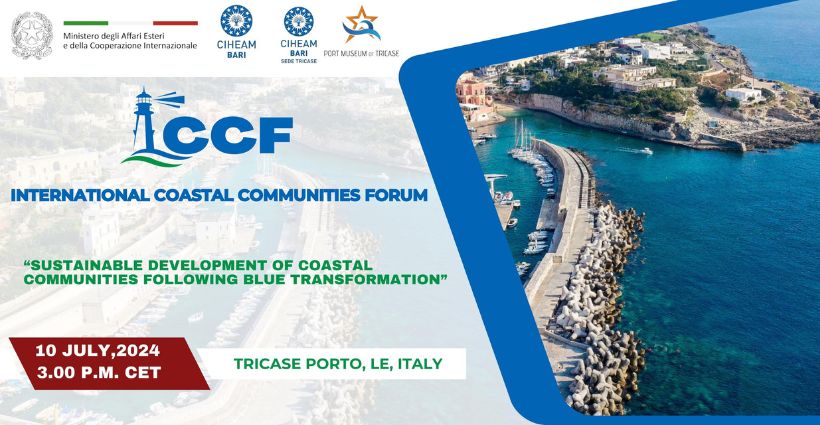
From 23 June to 19 July 2024, in the framework of the Student Mobility under the UniClaD project, an Erasmus+ KA2 programme, CIHEAM Bari will be hosting eight Master students from the Central Ukraine National Technical University.
About 18 researchers and experts from different CIHEAM Bari ‘s Knowledge Units: Land and Water Management, Organic Agriculture, Sustainable Agroecosystems and Resilience, Digital Lab and Precision Agriculture, Youth Entrepreneurship and Open Innovation, have been mobilised as mentors for the students' individual work and activities.
In line with the actions set out in the UniClaD project proposal, approximately 60 MSc and PhD students from the partner countries Azerbaijan, Moldova and Ukraine are being involved in a 28-day mobility period between April and July 2024, spent in other partner countries, i.e. Austria, Hungary, Italy, Lithuania, Poland and Spain.
As part of their learning experience, the students will benefit from attending lectures and training sessions, field trips and laboratory practicals.
They will also be able to:
Find more here:
PROGRAM ERASMUS +, PROJECT KA2 N° 609944-EPP-1-2019-1-LT-EPPKA2-CBHE-JP ‘Enhancing Capacity of Universities to Initiate and to Participate in Clusters Development on Innovation and Sustainability Principles’ (UniClaD) Project.
Learn more:
Le Giornate della Cooperazione Internazionale, che si svolgeranno al CIHEAM Bari dal 27 giugno al 4 luglio, vedranno la partecipazione di importanti figure istituzionali e dei coordinatori dei 36 progetti finanziati dalla Cooperazione Italiana e realizzati dall’Istituto di Bari in 26 Paesi del Mediterraneo, del Medio Oriente e dell'Africa Sub-sahariana.
I temi trattati durante i lavori saranno in linea con le priorità del Piano Mattei per l’Africa, con un focus particolare su istruzione, formazione, agricoltura, sviluppo rurale e gestione delle risorse idriche. L'obiettivo è garantire lo sviluppo delle comunità locali, promuovendo al contempo la transizione digitale. L’evento, inoltre, costituisce l’occasione per il lancio del documento strategico del CIHEAM Bari sull’approccio “Result Based Management”.
La settimana di lavori sarà arricchita dalla presenza del Segretario Generale del CIHEAM, Teodoro Miano, oltre che di numerosi ospiti istituzionali e personalità italiane e internazionali. In particolare, Giuseppe Corvaro, inviato speciale del Governo per il cambiamento climatico, terrà una relazione dal titolo "L’Italia e le sfide del cambiamento climatico", apportando il suo prezioso contributo alla discussione sul futuro sostenibile del nostro Paese e delle Regioni limitrofe.
Questo incontro semestrale rappresenta una preziosa occasione per la condivisione di esperienze e strategie, rafforzando la cooperazione e il dialogo tra i vari attori coinvolti nella cooperazione allo sviluppo.
The students who have completed the first year of the Master's programmes in Integrated Pest Management of Fruit and Vegetable Crops (IPM), Mediterranean Organic Agriculture (MOA), Sustainable Water and Land Management in Agriculture (W&L) and Sustainable Agro-Ecosystems and Resilience (SARe) have been awarded the Master Diploma of CIHEAM.
They are 41 students (23 women and 18 men) from 14 different countries (Albania, Algeria, Bosnia and Herzegovina, Egypt, Ethiopia, Ghana, Jordan, Kenya, Kosovo, Lebanon, Morocco, Palestine, Tunisia and Turkey.
CIHEAM Bari wishes its students all the best as they continue their careers and lives, valuing the knowledge acquired and the experience gained.
Heartfelt congratulations to them all on their achievements from the entire CIHEAM Bari community!
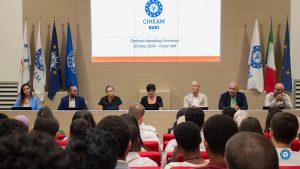
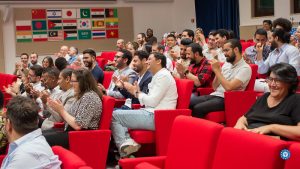
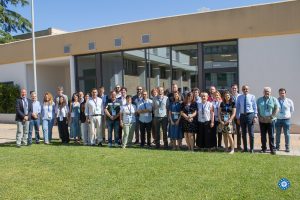
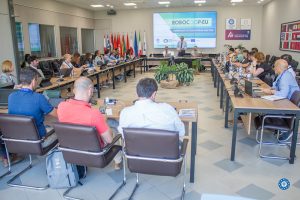
From 18 to 20 June, CIHEAM Bari (Cosimo Lacirignola Campus) will host the ROBOCOOP-EU project consortium meeting, organised in collaboration with the University of Extremadura (UEX), Spain.
ROBOCOOP-EU, a project co-funded by HORIZON EUROPE and CIRCULAR BIO-BASED EUROPE, aims to propose a breakthrough cultural change in the agri-food sector. The project focuses on the development of regional and circular bio-based business models to exploit waste streams generated by three key agricultural sectors: grape, olive and stone fruit production.
This two-day event will foster collaboration between 18 partners from seven countries: Belgium, Greece, Italy, Poland, Turkey, Spain and the UK. The consortium brings together a wide range of stakeholders, including research institutions (universities and research centers), industry partners (companies in the bio-economy sector), non-governmental organizations (NGOs) and innovation and technology hubs.
On the first day, partners will share progress on each work package and updates until month 12 of the project life.
In the afternoon of the second day, an additional meeting will be held in Ruvo di Puglia at the Bio-Distretto delle Lame. This meeting is addressed to Apulian stakeholders and producers of the primary sector, especially those active in grape and olive cooperatives. The Bio-Distretto delle Lame serves as a powerful tool that enables farms and cooperatives to adopt modern practices for managing all resources within their agro-ecosystems, thus promoting sustainability in the region.
During the visit of a UNIDO delegation to CIHEAM Bari and CIHEAM Tricase on 10-11 June, a Joint Declaration to promote sustainable and resilient agro-ecosystems was signed between the two institutions.
A key component of the agreement is the development of joint technical assistance projects in areas and countries of mutual interest, along with institutional capacity building.
Maurizio Raeli, Director of CIHEAM Bari, said: ‘The collaboration with UNIDO is fully in line with our firm commitment to promote innovation and entrepreneurship in Mediterranean and African countries and confirms our Institute's role as a hub for institutional building to strengthen policy makers’ capacities’.
Dejene Tezera, Director of UNIDO's Agribusiness Development Dpt, asserted that:‘Complementarity and synergy will be established to enhance capacity building and training opportunities within UNIDO countries of operation. This collaboration will positively impact the agricultural value chain and support coastal livelihoods, thereby fostering sustainable development and economic growth’.
The delegation was first welcomed at CIHEAM Bari campus. The delegates were briefed on innovation and youth employment, smart agriculture, water management, agro-ecology, crop protection and value chain development. They then travelled to Tricase for a technical focus on CIHEAM Bari's Blue Economy activities, including the sustainable development of coastal communities and areas.
This agreement is an important step in our partnership with UNIDO and we look forward to the positive impact it will have on sustainable development initiatives.
12 June 2024 | University of Agriculture, Tirana (Albania), 11.00 A.M.
The University of Agriculture in Tirana (Albania) will host the inaugural event for the 1st Level International Master in Open Innovation and Youth Entrepreneurship in the Mediterranean Green Sector on 12 June 2024 at 11 am. This new academic programme is a significant investment in the skills of young people, to steer the process of building innovation ecosystems and support a greener and more competitive transition of local economic systems in Albania.
It is a first step to train future innovation managers who will be the champions of new approaches and methodologies in building innovation ecosystems through the involvement of public institutions and business support organisations.
The initiative is promoted by an international partnership between the University of Agriculture of Tirana, LUM University "Giuseppe Degennaro" of Bari, CIHEAM and CIHEAM Bari, the Ministry of Foreign Affairs and International Cooperation, with the support of Intesa Sanpaolo Bank Albania under the auspices of the Apulia Region, the Albanian Ministry of Education, Sports and Youth, the Ministry of Agriculture and Rural Development.
The Master's objective is to educate a new generation of innovation managers, facilitate the establishment of start-ups, and encourage private companies to participate in the green transition process towards innovative business models. Additionally, the initiative aims to involve students from the Balkan countries, thereby strengthening the geopolitical and social value of the initiative. The programme also seeks to provide attractive employment opportunities to young people from Albania and the Balkans serving their territories and local economies. Furthermore, it offers a double degree that is valid for Albania and Italy/EU, thanks to the collaboration between the University of Agriculture in Tirana and LUM University in Italy.
The inaugural event, entitled "The Future is young. Changing mindsets to deal with change!” will be opened by Damiano Petruzzella, CIHEAM Bari. Welcome addresses will be delivered by Fatbardh Sallaku, Rector of the Agricultural University of Tirana, Antonello Garzoni, Rector of LUM, Maurizio Raeli, Director of CIHEAM Bari, Alessandro D'Oria, Director of Intesa Sanpaolo Bank Albania, and Teodoro Miano, Secretary General of CIHEAM.
Institutional speeches will follow: Ogerta Manastirliu, Minister of Education, Sports and Youth; Anila Denaj, Minister of Agriculture and Rural Development; Arjan Ymeri, Director of Startup Albania; Silvia Visciano, Puglia Region.
Frida Krifca, President of CIHEAM, will draw the conclusions. The meeting will be chaired by Erinda Lika, Vice-Chancellor of the University of Agriculture in Tirana.
A cooperation agreement for the implementation of the 1st Level International Master in Open Innovation and Youth Entrepreneurship in the Mediterranean Green Sector will be signed in the margins of the meeting between the University of Agriculture of Tirana, LUM University, CIHEAM Bari and CIHEAM General Secretariat.
The Master's programme and the training of innovation managers are the starting point for the development of an innovation ecosystem in Albania aimed at the green transition. This model aims at strengthening and qualifying incubators, promoting activities to empower local start-ups and collaborating with businesses, in synergy with the Startup Albania Agency, with which CIHEAM Bari has formalised a cooperation agreement.
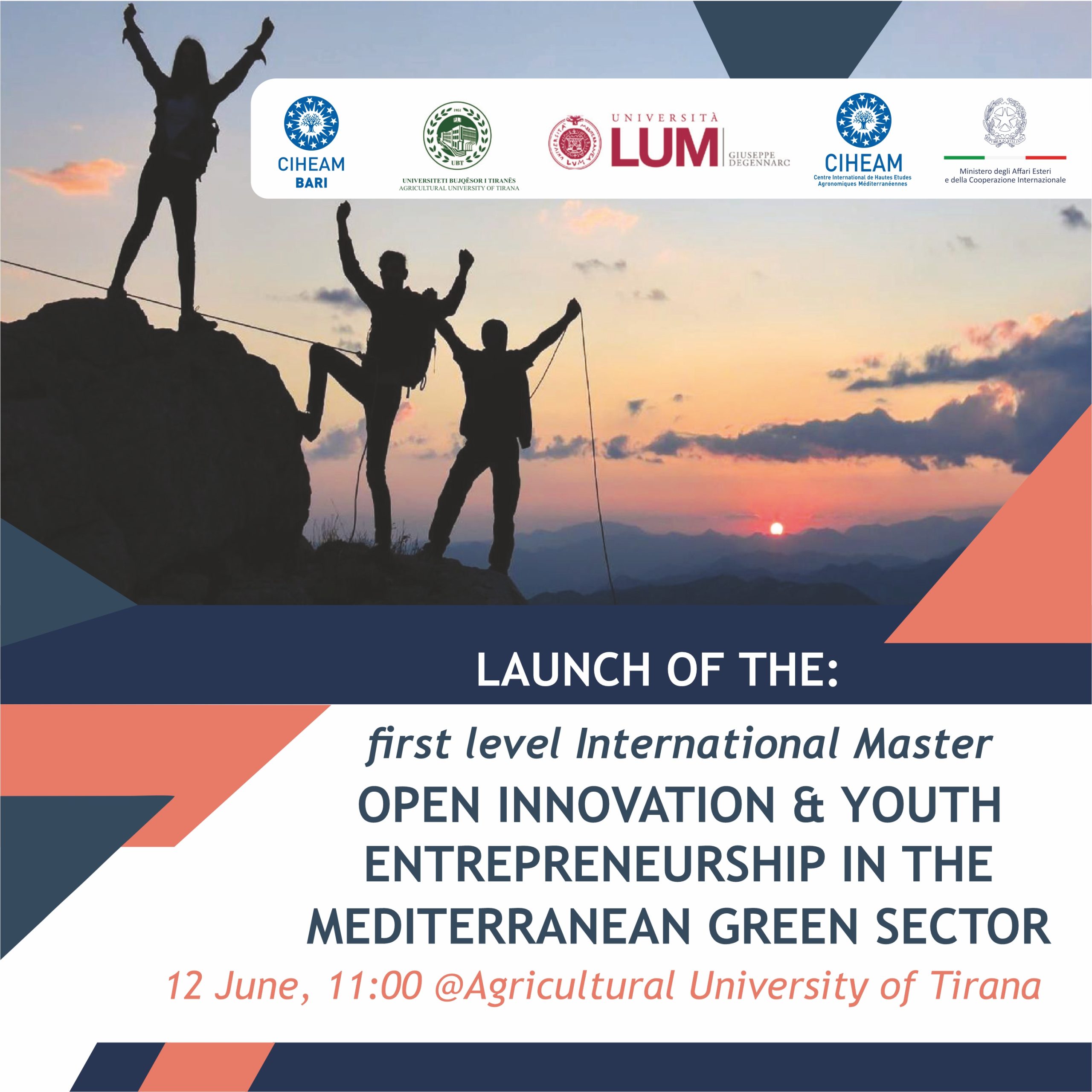
12 giugno 2024 | Università Agraria di Tirana (Albania), ore 11.00
L'Università Agraria di Tirana (Albania) ospiterà, il prossimo 12 giugno 2024 alle ore 11.00, l'evento di lancio del Master internazionale di 1° livello in Open Innovation e Imprenditorialità Giovanile nel Settore Green del Mediterraneo. Questo nuovo programma accademico rappresenta un investimento cruciale nelle competenze dei giovani per guidare il processo di costruzione di ecosistemi di innovazione e sostenere una transizione più verde e competitiva dei sistemi economici locali in Albania. È un primo passo per formare i futuri manager dell'innovazione, che diventeranno i principali promotori di nuovi approcci concettuali e metodologie nella costruzione di ecosistemi innovativi, attraverso il coinvolgimento di istituzioni pubbliche e organizzazioni di supporto alle imprese.
L'iniziativa è promossa da un partenariato internazionale tra Università Agraria di Tirana, LUM “Giuseppe Degennaro” di Bari, CIHEAM e la sua sede italiana, Ministero degli Affari Esteri e della Cooperazione Internazionale, con il supporto di Intesa Sanpaolo Bank Albania e con il patrocinio della Regione Puglia e dei ministeri albanesi dell'Istruzione, dello Sport e della Gioventù, dell'Agricoltura e dello Sviluppo Rurale.
Il Master si propone di formare una nuova generazione di manager dell'innovazione, creare startup e stimolare le aziende private a partecipare al processo di transizione verde verso modelli di business innovativi, coinvolgere studenti dai Paesi balcanici, rafforzando la valenza geopolitica e sociale dell'iniziativa, creare opportunità di lavoro per i giovani albanesi e dei Balcani a servizio del territorio e dell’economia locale. Inoltre, il double degree è valido per Albania, Italia e Paesi europei, grazie alla collaborazione tra l’Università Agraria di Tirana e la LUM.
L’incontro di lancio, dal titolo Il futuro è dei giovani. Cambiare mentalità per affrontare il cambiamento, sarà aperto da Damiano Petruzzella, CIHEAM Bari. I saluti di benvenuto saranno a cura di Fatbardh Sallaku, rettore dell’Università di Agraria di Tirana, Antonello Garzoni, rettore della LUM, Maurizio Raeli, direttore del CIHEAM Bari, Alessandro D’Oria, direttore di Intesa Sanpaolo Bank Albania, e Teodoro Miano, segretario generale del CIHEAM.
Seguiranno interventi istituzionali di Ogerta Manastirliu, ministro dell'Istruzione, dello Sport e della Gioventù, Anila Denaj, ministro dell'Agricoltura e dello Sviluppo Rurale, Arjan Ymeri, direttore dell’Agenzia Startup Albania, Silvia Visciano, Regione Puglia.
Le conclusioni saranno affidate a Frida Krifca, presidente del CIHEAM. L’incontro sarà moderato da Erinda Lika, vicerettore dell’Università di Agraria di Tirana.
A latere dell’incontro, Università Agraria di Tirana, LUM, CIHEAM Bari e CIHEAM SG firmeranno un accordo di cooperazione per l’attuazione del Master internazionale di 1° livello in Open Innovation e Imprenditorialità Giovanile nel Settore Green del Mediterraneo.
Il Master e la formazione di manager dell'innovazione rappresentano il punto di partenza per lo sviluppo di un ecosistema dell'innovazione in Albania, indirizzato alla transizione verde. Questo modello aspira a potenziare e qualificare gli incubatori di imprese, promuovere attività di rafforzamento delle startup locali e la collaborazione con le imprese, in sinergia con l'Agenzia Startup Albania, con la quale il CIHEAM Bari ha formalizzato un accordo di cooperazione.
The book, 'Sustainable Food Systems. Change of Route in the Mediterranean', explores food system sustainability through a transdisciplinary approach, highlighting the intricate challenges which face food systems - from production to consumption - emphasising the vital role of the Mediterranean diet across different sectors, and recognising ecosystem-dependent relationships and interdependencies.
Inspired by the discussions held at the Third World Conference on the Revitalisation of the Mediterranean Diet, organised by CIHEAM Bari, Italy in 2022, the book is an ideal continuation of a cultural journey towards a change in the vision of Mediterranean food systems, moving from agri-food production to sustainable consumption and placing the Mediterranean diet and the consumer at the heart of this new course.
Building on these assumptions, CIHEAM has committed to developing its own vision and a relevant action plan on food system sustainability by implementing joint cooperative projects.
Il libro “Sistemi alimentari sostenibili. Cambio di rotta nel Mediterraneo” affronta il grande tema della sostenibilità dei sistemi alimentari con un approccio transdisciplinare che consente di affrontare le complessità dell'intero sistema alimentare, dalla produzione al consumo, e di rimarcare il ruolo vitale che la Dieta Mediterranea riveste nei diversi settori, riconoscendo le relazioni e le interdipendenze tra gli ecosistemi.
Influenzato dalle discussioni della Terza Conferenza Mondiale sulla Rivitalizzazione della Dieta Mediterranea, organizzata dal CIHEAM di Bari nel 2022, il libro nasce come prosecuzione ideale di una navigazione culturale che esprime la necessità di un cambiamento nella visione dei sistemi alimentari del Mediterraneo, con il passaggio dalla produzione agroalimentare al consumo sostenibile e con la Dieta Mediterranea e i consumatori al centro di tale cambio di rotta.
Proprio su tali presupposti, il CIHEAM è impegnato nella costruzione di una sua visione sulla sostenibilità dei sistemi alimentari nel Mediterraneo e di un relativo piano d’azione attraverso l’implementazione di progetti cooperativi congiunti.
Le livre "Sustainable Food Systems: Change of Route in the Mediterranean" propose des réflexions sur la durabilité des systèmes alimentaires dans une perspective transdisciplinaire, en insistant sur les défis complexes auxquels ils se trouvent confrontés (de la production à la consommation), en mettant en évidence le rôle primordial du régime méditerranéen dans les différents secteurs, et en reconnaissant les relations et les interdépendances écosystémiques.
Inspiré par les discussions tenues lors de la Troisième conférence mondiale sur la revitalisation de la diète méditerranéenne, organisée par le CIHEAM Bari, en Italie, en 2022, cet ouvrage s'inscrit dans la continuité d'un parcours culturel vers un changement de vision des systèmes alimentaires méditerranéens, qui vise à encourager la transition d'une production agroalimentaire à une consommation durable et à placer la diète méditerranéenne et le consommateur au cœur de cette nouvelle dynamique. Partant de ces constats, le CIHEAM s'est engagé à développer sa propre vision sur la durabilité des systèmes alimentaires et un plan d'action pertinent en mettant en œuvre des projets conjoints de coopération